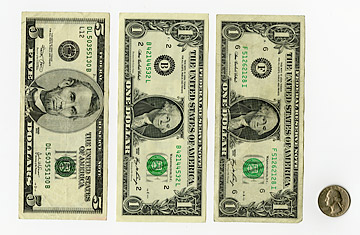
The federal minimum wage is set at $7.25 per hour
John Raese, the Republican candidate for Senator in West Virginia, is running against the minimum wage. But he is not just saying it is a bad idea — he's arguing that it is fundamentally unconstitutional. Joe Miller, the Republican candidate for Senate in Alaska, is saying the same thing.
Conservatives often oppose attempts to raise the minimum wage and question whether it makes economic sense — as Linda McMahon, the Republican Senate candidate in Connecticut, has done this year. But Raese and Miller are going much further, arguing that Congress lacks the power to adopt a minimum-wage law.
It sounds like a bizarre argument to make. The federal minimum wage has been around since Franklin D. Roosevelt signed the Fair Labor Standards Act in 1938. In 1941, the Supreme Court upheld it by a unanimous vote, in a decision written by a Republican Justice. Among legal experts, there is little real debate about the minimum wage's constitutionality.
Not that that has stopped opponents from railing against the minimum wage for decades. After all, Big Business really does not like the laws. Payroll is a large part of most companies' expenses, and many — particularly in the fast-food and hotel industries — see the minimum wage as a burden. They argue that it has been set at too generous a level, and that it actually prevents more out-of-work Americans from being hired.
The trouble is, it is a hard case to make. At $7.25 an hour, the federal minimum wage is almost impossible to survive on. Someone who works a 40-hour week and earns the minimum wage makes around $15,000 a year — or about 70% of the official poverty level.
In recent years, while the wealthiest Americans have gotten richer and richer — the top 25 hedge-fund managers personally took in more than $25 billion last year — minimum-wage workers are being left behind. Adjusted for inflation, the minimum wage today is 17% lower than it was in 1968.
Most Americans across the political spectrum support strong minimum-wage laws. Many liberals like them because they put more money in the pockets of people who desperately need it. Many conservatives favor them because they make it worthwhile to have a job — and reward people for getting out of bed every day and doing an honest day's work.
A new poll by the Public Religion Research Institute found that 67% of the American public not only supports the minimum wage but would like to increase it to $10 an hour. When voters get to weigh in, minimum-wage laws do very well. In Florida in 2004, while President George W. Bush was winning the state over John Kerry, voters supported a $1 increase in the state minimum wage by a margin of 72% to 28%. A year later, initiatives to increase state minimum wages appeared on the ballot in six states — Arizona, Colorado, Montana, Missouri, Nevada and Ohio — and passed in all six.
Since minimum-wage opponents have no reasonable chance of prevailing in Congress or state legislatures, they are turning to their last best hope: the judiciary. Given the strong support the minimum wage has gotten from the Supreme Court, it may seem like a long shot. But politicians like Raese and Miller — who both have solid chances of being elected as Senator — are starting to lay the groundwork. Conservatives like them are looking back to an earlier, pre–New Deal era, from the late 1890s through the 1930s, when conservative courts routinely struck down laws designed to help working people.
This was the so-called Lochner era, named after the Supreme Court's 1905 decision in Lochner v. New York, striking down a state law setting maximum hours for bakers. In 1923, the court also ruled that a minimum-wage law in the District of Columbia was unconstitutional. In each case, the court insisted that the due-process clause of the 14th Amendment guaranteed liberty of contract, which prevented the government from imposing worker protections like these.
The New Deal, and Roosevelt's appointments to the Supreme Court, ended the Lochner era, ruling that liberty of contract did not prevent government from imposing reasonable regulations to protect workers and others from the excesses of business.
But if conservatives are ever able to bring it back, the courts could do away with far more than the minimum wage. They could revive now discredited ideas of liberty of contract and outdated views about the scope of the Federal Government's power to pass all sorts of federal laws, including those related to the right to join a union, the Occupational Safety and Health Administration and even Social Security.
If Big Business would be the winner from a repeal of the minimum wage, it is no great secret who the losers would be. The minimum wage puts extra money in the pockets of the nation's lowest-paid workers, whose salaries could fall significantly — particularly these days, given the weak economy and the high rate of unemployment.
When the minimum wage was raised last year to $7.25, 63% of the workers who benefited were women. Single parents make up 7% of the workforce, but they were 10% of the people who benefited from the last minimum-wage increase. Some 2.2 million children were in families whose incomes went up.
For some time now, conservatives have been railing against the supposed "judicial activism" of liberal judges. Now, they are starting to change course and argue for a new kind of judicial activism — one that would strip away the rights of workers and protect corporations' constitutional right to fatter profits.
Cohen, a lawyer, is a former TIME writer and a former member of the New York Times editorial board. Case Study, his legal column for TIME.com, appears every Wednesday.
